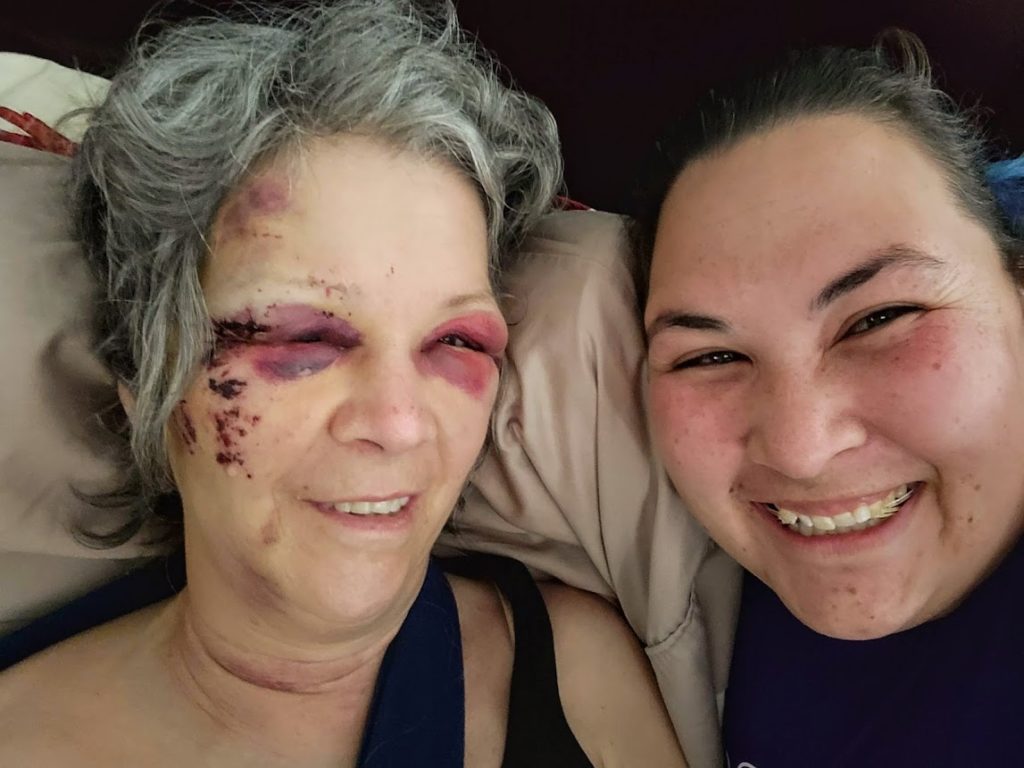Snapshots of Dementia: Four Things I Learned in My Crash Course

Crash.
That’s what happened to me in mid-May last year.
No, it wasn’t a car accident. We were visiting our local daughter and her family, who all had brand-new bikes. Our then three-year-old grandson was out riding his bike along with his 15-year-old foster brother (if you missed H’s story, find it here).
“Mom, you can take my bike if you want and ride with them,” my daughter offered.
Never mind that I hadn’t been on a bike for years. I used to ride a unicycle, so a bike should be no problem, right?
Never mind that I need to stay well for my husband’s sake. Bike riding helps keep people healthy, right?
Never mind any of the second thoughts I’ve had since that eventful day.
I dutifully donned my daughter’s helmet (for which I am still thanking God) and rode down their long driveway behind the boys. I won’t bore you with all of the details, but after a few successful rides up, back, and around the drive and cul-de-sac, I hit some gravel. The bike flew one way, and I flew the other: down.
Cut to the emergency room, one stitch in my left eyelid, bandages over deep wounds in my elbow, bruises and swelling on my face, and a broken left humerus (upper arm bone). My daughter, who went with me, brought me home around midnight. Under the influence of pain meds, I lost consciousness at home early the next morning, hitting my forehead on a door and wedging myself inside the bathroom in the process. My new motto: Go big or go—back to the ER.
Another visit there for my daughter and me, but thankfully no concussion or other major injuries (the giant hematoma waited a few days to pop up on my forehead).
This began a long saga of doctor’s visits, physical therapy, and ultimately a reverse shoulder replacement and more physical therapy. Almost a year later, my arm/shoulder still isn’t 100 percent, but it’s much better.
Tom didn’t crash. He didn’t even—thankfully—see the crash take place. But through this time, I learned a few lessons to add to my care partner knowledge, and I want to share them now.
1) “Big feelings” happen. This is true not just with our four-year-old grandson but for those living with dementia too. As soon as the ambulance left, Tom paced around our daughter’s backyard for an hour or so, crying. Seeing me leave in the ambulance upset him for days. His brain can’t process change well, and his amygdala, the part of the brain that handles emotions, was working overtime. Anyone would feel upset if their spouse had such a bad accident. For someone living with dementia, it’s terrifying.
2) I can’t do this alone. I am Tom’s primary care partner, which means I take care of his daily needs. He can still do a lot for himself, but I manage his life, make sure he eats, sleeps, showers, and so on, because without me, he might not do any of those things and wouldn’t do most of them well. I knew a day would come when I needed more than occasional help. I never realized it would come so soon.
3) Family matters. I don’t consider Tom a burden, but his dementia does make for some extra challenges. I needed help for the first few weeks (post-accident and then post-surgery) with Tom’s daily care and meals. I also needed extra rest, something I couldn’t have had without someone else present to keep a watchful eye on Tom. Although I’ve tried, I can’t thank our children enough for all they did during this time. Without their rotating in and out to care for us, I would have had to (while injured) find a paid caregiver and/or place Tom in a care center temporarily, which would have been hard on us both. Friends also supported us with prayers, meals, and more.
4) Sharing is caring. My second trip to the hospital earned me an overnight stay. That happened to be Sunday, the day I organize Tom’s medication for the week, including his vitamins. Because I didn’t have a prepared list, I had to go over everything verbally with my son-in-law from my hospital bed. I now keep an updated medication list in a shared family document for just such a situation. This time also made all of our children more aware of Tom’s basic schedule as well as what he can and can’t do on his own right now.
With these lessons, God has taken our most challenging year yet and turned it for good. I’ve learned, my kids have learned, and Tom and I have both experienced great love and care throughout.
Accidents happen. Although I would never choose to go through anything like this again, I can approach whatever lies ahead with confidence because of what God has done for us in the past.
What about you? What lessons have you learned from a challenging season, in caregiving or otherwise? Feel free to share your comments here or on social media. Your story matters, and so do you.





You have an attitude of gratitude which is a blessing as you experience challenges in life! Thank you for sharing your beautiful heart with others!
Thanks so much, Millie. We are also grateful for sweet friends like you!